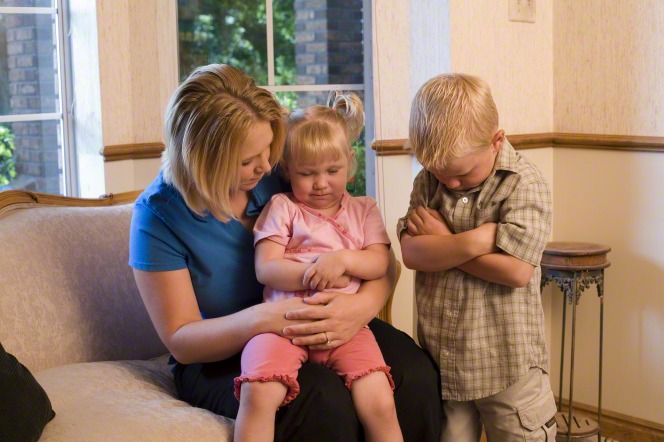This is a touchy subject for many, many people. These days, about half of couples get divorced, which is just insane to me! That means that most people have been touched by divorce in some way, whether their parents divorced, they are divorced themselves, or they know someone who has been divorced. I’m not sure anything shows Satan’s attack on the family quite as well as the increasing prevalence of divorce. Families everywhere are shattering into pieces, along with the hearts of children and spouses.
My dad’s parents got divorced when he, the oldest child, was 14. My parents got divorced when I, the oldest child, was 14. A pattern was beginning, and that scared me. Therefore, I decided I was NEVER getting married. I was just so afraid of my marriage ending that I thought I could avoid it altogether. I was terrified of inflicting the pain I had felt when my parents divorced upon my own children, so I made the decision that I just wouldn’t have kids altogether. I think this is a common reaction among children of divorced parents, and so I want to direct my message to those lovely, broken people who have given up hope. I’m so sorry for what happened to you, but I promise, YOU DON’T HAVE TO REPEAT THE MISTAKES OF YOUR PARENTS. You have this wonderful opportunity ahead of you to create the life for your children that you didn’t get to have.
I think the first step in this process of accepting your parent’s divorce while leaving the door open for your own marriage is acknowledging the pain you went through. I think it is pretty much impossible to watch two people you love decide they don’t love each other, and not have some lasting negative effects in your life. I can remember feeling completely alone. I couldn’t turn to my parents, because they were grappling with their own demons and their own pain. I couldn’t turn to my friends, because they all had what seemed to be perfect little families. It was just me and my siblings, surrounded by a storm of anger and change and loss.
Okay, you say, I get it. I’m messed up. I already knew that, Jenna. So why don’t you tell me something I don’t know?
Here’s something you probably don’t know. Or at least, it is something I still wrestle with. Why did my parents get divorced? Of course, I know the overarching reasons. I know about the fights and the mistakes and the betrayals. But, I still don’t totally understand. I don’t understand why my parents got divorced while other people in similar situations end up staying together. That doesn’t seem totally fair to me.
That confusion, which I think most of us deal with, brings me to the next step- understanding the patterns of dysfunction that led to your parent’s divorce. In my case, as I have learned more about both of my parents and their struggles, I have realized that the situation wasn’t as black and white as I once imagined. There wasn’t one person to blame. Rather, it was a combination of factors and mistakes that led up to their divorce.
I know this is painful, but take some time to reflect on your parents and their marriage. If you were too young when they were divorced, ask others who were present at the time. Ask yourself “What patterns of dysfunction led to their divorce?” As much as this process just straight up stinks, it will help you learn about the unhealthy patterns that existed in the home you were raised in. Once you have labeled those cycles, you can work through any tendencies you have to repeat the mistakes of your parents. For example, I have adopted my dad’s habit of bottling up emotions instead of talking them through. I am trying to express my emotions and become more open in preparation for my own marriage.
The third step is realizing that most problems in marriage can be overcome without separation. President James E. Faust said that the only time divorce should be considered is in “a prolonged and apparently irredeemable relationship which is destructive to a person’s dignity as a human being”. The book offers several suggestions to ensure that the decision to divorce is the correct one.
- Allow time to decide about the divorce: Although it may be tempting to bow out at the first sign of trouble, a marriage is something worth fighting for. Remember, this is someone you once love SO much that you promised to spend forever with them. Don’t give up on forever too quickly.
- Try to resolve problems first: If both people are willing to change, then there is hope! Marriage counseling is a great option. A trained professional can offer suggestions and help that can totally change your relationship. For example, if you are struggling to communicate effectively then a therapist can offer suggestions that can alleviate the problem.
- Make adjustments to your expectations: Perhaps your spouse is no longer interested in going to church with you, or is struggling with an addiction. Rather than washing your hands of the entire relationship, consider the possibility of putting aside your needs for a time and helping them through. Pray to know how to support them while staying mentally healthy yourself. In addition, look for things you need to change in order to be a better spouse.
Here’s the thing. Regardless of whether you follow these steps or not, marriage is a risk. It’s a huge risk. You are giving your heart to an imperfect human being who will, undoubtedly, make mistakes. However, it is SO worth it. Marriage means having a constant companion during the best and worst times of your life. It means having someone to raise children with. It means love and joy and passion and friendship. So take the leap.







